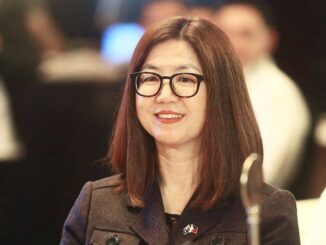
MANILA, Philippines — The Philippines can depend on a “chorus of nations” declaring support for the 2016 arbitral ruling to defend its maritime rights and entitlements as well as help maintain a rules-based order in the face of China’s acts of aggression and flouting of international law, US Ambassador Marykay Carlson said yesterday.
“We are proud to be among the chorus of nations that have consistently lent their voices to supporting the Philippines and calling out unlawful and escalatory behavior,” Carlson said in a speech before the Manila Dialogue on the South China Sea.
“We are far from alone. More and more nations – from East Asia to Western Europe – have spoken out to support the Philippines, uphold international law and urge the PRC (People’s Republic of China) to cease escalatory and dangerous actions that impede the exercise of freedom of navigation and overflight from which all nations benefit,” she said.
“The collective voice of the international community is loud and getting louder, and it speaks to our common resolve in support of international law and the standards that benefit us all,” she declared.
Carlson said the US, the Philippines and like-minded partners share a common vision for a free, open, prosperous, connected and resilient Indo-Pacific region.
“Standing up for the rules-based order in the South China Sea is an integral part of advancing this shared vision. This is why the United States has been unequivocal in supporting the historic 2016 Arbitral Tribunal decision, a milestone that affirmed the rights of the Philippines in the South China Sea as set out in the United Nations Convention on the Law of the Sea,” she stressed.
“The Philippines and the United States are not alone – many nations have expressed support for the 2016 ruling which, as set out in the text of the Convention, is final and legally binding on both the Philippines and the PRC,” Carlson said.
“This is in part because of the implication of the ruling for the international community. By firmly rejecting the PRC’s expansive maritime claims and affirming the Philippines’ sovereign rights and jurisdiction in the South China Sea, the Tribunal showed that international law is more than just a concept and that it applies to all countries, regardless of their relative economic or military power,” she pointed out.
Carlson said the late foreign affairs chief Albert del Rosario, whom she called a great Philippine diplomat, characterized it best when he said that international law “allows the weak to challenge the powerful on an equal footing, confident in the conviction that principles trump power; that law triumphs over force and that right prevails over might.”
However, she said China has taken the opposite approach of “might makes right” and “giving preference to big nations over small ones, as if this concept should be taken as ‘just a fact of life.’”
“Despite the indisputable fact that the decision is final and legally binding on the parties to the dispute, the PRC continually rejects the tribunal’s ruling in its rhetoric and actions that clearly violate international law,” she lamented.
Also at the Manila Dialogue on the SCS, Japanese Ambassador Endo Kazuya voiced his country’s commitment to further strengthen its relations with the Philippines in support of continuing efforts to uphold international order based on rule of law.
Endo attended the event – held from Nov. 6 to 8 – with Japan Coast Guard Vice Commandant for Operations Kanosue Hiroaki as panelists.





Be the first to comment